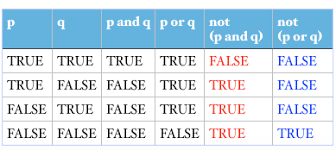Vocab/Booleans
Homework Assignments
- Compound Boolean Expressions
- Truth Tables and De Morgan's Law
- Comparing Numbers
- Comparing Strings
- HOMEWORK
- test two things to be true before body of conditional is executed
- '&&' used as logical operator and to join 2 booleans
//ex
//want to play video games, but parents only let you if you've finished your homework and taken a shower
public class compoundBooleans
{
public static void main(String[] args)
{
boolean didHomework = true;
boolean tookShower = false;
if (tookShower && didHomework)
{
System.out.println("You can play");
}
else
{
System.out.println("No, you can't play");
}
}
}
//demorgans law
//has to be back home before 10, and has to walk the dog
public class demorgans
{
public static void main(String[] args)
{
boolean backby10 = true;
boolean walkedDog = false;
if (!(backby10 && walkedDog))
//means not A OR not B
{
System.out.println("True. You were back by 10 but didn't walk the dog");
}
else
{
System.out.println("You were back in time and walked the dog");
}}}
public class demorgans
{
public static void main(String[] args)
{
boolean backby10 = true;
boolean walkedDog = false;
if (!(backby10 || walkedDog))
//means not A AND not B
{
System.out.println("False. You were back by 10 but didn't walk the dog");
}
else
{
System.out.println("You were back in time and walked the dog");
}
}
}
//comparing numbers
public class wrappers
{
public static void main(String[] args)
{}}
int x = 10;
int y = 14;
if(x==(y)) {
System.out.println("Both x and y are equal");
}else {
System.out.println("x and y are not equal");
}
public class wrappers
{
public static void main(String[] args)
{}}
// int x = 10;
// System.out.println(x.toString()); ------ doesn't work because x is a primitive data type, not a modifiable object
Integer x = new Integer(10);
//to get around this, you define an integer wrapper class
System.out.println(x.compareTo(15));
//x is now an object, not a primitive data type
System.out.println(x.compareTo(5));
//-1 is b/c 10 is less than 15
//1 is because 5 is less than 10
int xy = 83;
int yz = 20;
int compare = Integer.compare(xy, yz);
if(compare>0) {
System.out.println("xy is greater than yz");
}else if (compare<0){
System.out.println("xy is less than yz");
}else{
System.out.println("xy and yz are equal");
}
class comparingStrings{
public static void main(String args[]){
}
}
String s1="hello";
String s2="goodbye";
String s3=new String("hello");
String s4="you're a good friend";
String s5="goodbye";
if (s2 == s5){
System.out.println("true");
}
System.out.println(s1.equals(s2));
System.out.println(s1.equals(s3));
System.out.println(s1.equals(s4));
//UNIT 3
//2009 3b
public int getChargeStartTime(int chargeTime)
{
int lowestPrice = 0;
for(int i = 1; i < rateTable.length; i++)
if(getChargingCost(startHour, chargeTime) <
getChargingCost(i, chargeTime))
i = startHour;
return i;
}
//2017 1b
public boolean isStrictlyIncreasing() {
boolean increase = true;
for (int i = 0; i < digitList.size() - 1; i++) {
if (digitList.get(i).intValue() >= digitList.get(i + 1).intValue()) {
increase = false;
return true;
}
//2019 3b
public boolean isBalanced(ArrayList<String> delimiters) {
int openDels = 0;
int closeDels = 0;
for (String del : delimiters) {
if (del.equals(openDels)) {
openDels++;
} else {
closeDels++;
if (closeDels > openDels) {
return false;
}
}
return openDels == closeDels;
}

